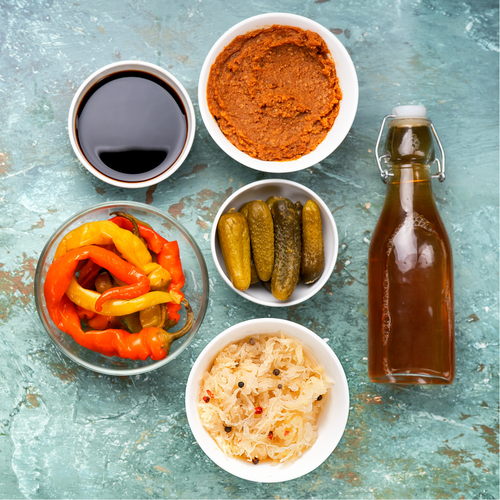What is the inflammatory state?
It allows the body to fight off pathogens that might cross its path. Inflammation is therefore a defensive reaction of the body that should be punctual and temporary. However, when it becomes chronic, that's when the problems begin... This can lead to chronic pain (muscles, joints, headaches, etc.), weight gain, fatigue, mood disorders, gastrointestinal disorders, frequent infections and higher risks of developing certain chronic diseases, including cardiovascular and intestinal diseases, but also diabetes, arthritis, cancer, etc.
What are the factors that promote chronic inflammation?
- oxidative stress which results from an imbalance between free radicals (unstable molecules which oxidize cells and are harmful when in excess) and antioxidants (molecules which neutralize excess free radicals)
- an acid-base imbalance : often linked to our consumption habits, the body's pH becomes too acidic, which promotes the development of certain diseases.
- excessive consumption of pro-inflammatory foods (source of inflammation) such as bad fats (saturated fatty acids and trans fatty acids), excess sugars, excess omega 6 (dairy products, meat, eggs) compared to omega 3 (oily fish, flax and walnut oil), excess lactose and excess gluten.
Well, that's a lot... But don't panic, according to a study conducted by Harvard Medical School, one of the best ways to reduce inflammation in our bodies is through diet. Indeed, certain foods with antioxidant and anti-inflammatory properties have considerable effects. In particular, they help rebalance the intestinal microbiota by promoting good bacteria, which are highly impacted by inflammatory conditions. They also neutralize excess free radicals, responsible for the aging of our cells, thanks to the antioxidants they contain.
What are these foods with super powers?
- Fruits and vegetables : They are rich in fiber and antioxidants (often contained in food pigments), making them ideal for the intestinal microbiota and acid-base balance. The most interesting for combating inflammation are red fruits and cruciferous vegetables such as broccoli, cauliflower, red cabbage, etc.
- Oily fish : These contain omega-3, lipids with anti-inflammatory properties. They are found mainly in mackerel, sardines, salmon, and herring.
- Different oils : These are perfect for stocking up on omega-3s. Adding rapeseed, flax, hemp, and walnut oils to your salad dressings is great for reducing inflammation. Be careful, though, as they're best avoided overheating, as they can lose all their benefits.
- Turmeric : This spice contains curcuminoids, molecules that partially inhibit inflammation. Incorporate it into your hot dishes or even your vinaigrettes to liven up a bland salad.
- Legumes —lentils, chickpeas, dried beans, etc.—are true nutritional gems. They contain a lot of fiber, which is good for the gut microbiota, and flavonoids, which are anti-inflammatory molecules. To reap their benefits, it's recommended to consume at least 2 to 3 servings per week.
- Dark chocolate should contain at least 75-80% cocoa to enjoy the benefits of chocolate without increasing your sugar intake. The more cocoa, the more polyphenols the chocolate will contain, molecules that help reduce oxidative stress.
- Oilseeds : Like hazelnuts, almonds, walnuts, etc., they contain a good number of phytosterols and phenolic antioxidants. Just a handful a day, or about 30g, allows you to benefit from their anti-inflammatory properties.
- Whole grains : thanks to their fiber content, they contribute to a good balance of the microbiota and blood sugar (blood sugar level) with their low glycemic index.
- Water , which makes up 70% of the human body, is essential for proper hydration of all organs. The icing on the cake? Drinking water promotes cell renewal and the elimination of toxins.
Obviously, the goal isn't to eat only these foods to be healthy. The key is to eat a varied and diverse diet, trying to incorporate these foods into your diet as much as possible.
Sources:
[1] Foods that fight inflammation, Harvard Medical School, August 2020
[2] Christ A, Lauterbach M, Latz E. Western diet and the immune system: an inflammatory connection. Immunity . 2019 Nov 19;51(5):794-811.
[3] Vazhappilly CG, Ansari SA, Al-Jaleeli R, Al-Azawi AM, Ramadan WS, Menon V, Hodeify R, Siddiqui SS, Merheb M, Matar R, Radhakrishnan R. Role of flavonoids in thrombotic, cardiovascular, and inflammatory diseases. Inflammopharmacology. 2019 Oct;27(5):863-9.
[4] Bailey MA, Holscher HD. Microbiome-mediated effects of the Mediterranean diet on inflammation. Advances in Nutrition . 2018 May 1;9(3):193-206.













